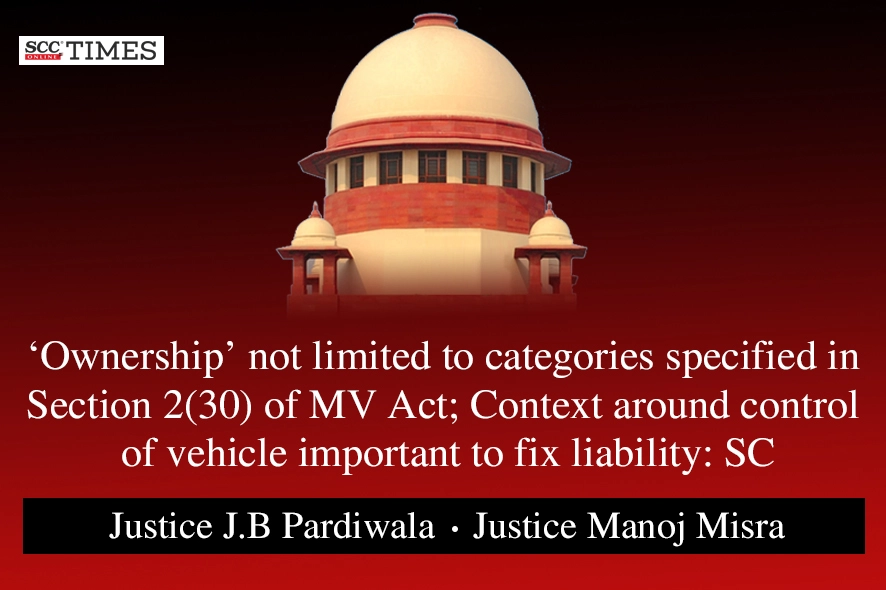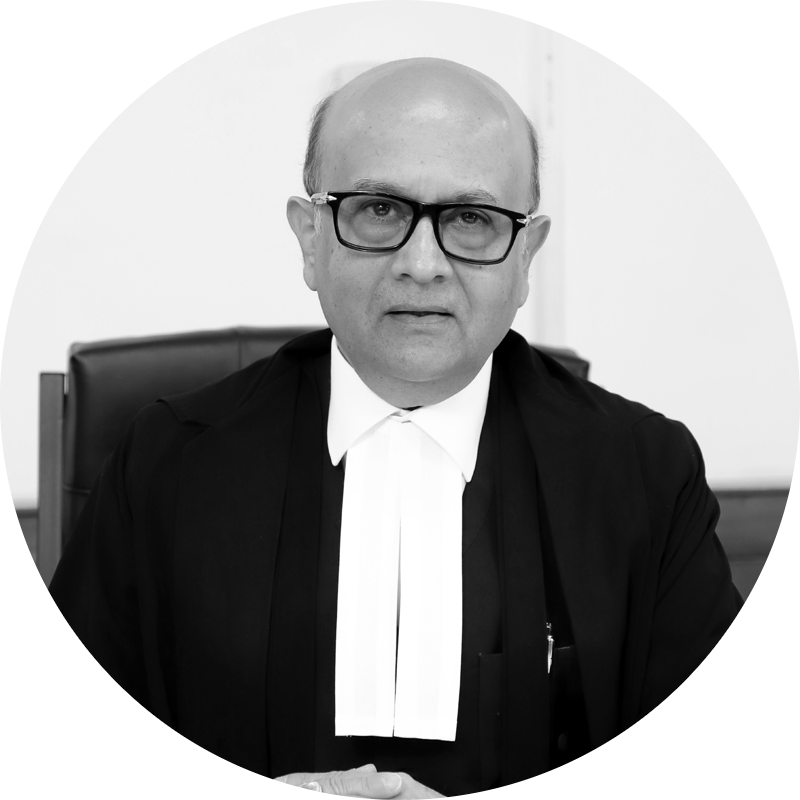Supreme Court: While considering the instant appeal challenging the enhancement of compensation by Chhattisgarh High Court, in a motor accident claim and deliberating over issues of ownership of the offending vehicle; the J.B Pardiwala and Manoj Misra*, JJ., stated that ‘owner’ of a vehicle is not limited to the categories specified in Section 2(30) of the Motor Vehicles Act, 1988. If the context so requires, even a person at whose command or control the vehicle is could be treated as its owner to fix tortious liability for compensation payment.
Background and Legal Trajectory:
A claim petition for death compensation was filed before the Tribunal by the claimants under Section 166 of the Motor Vehicles Act, 1988 (MV Act), against the driver of the offending vehicle; manufacturer (Hindustan Motors); and the proprietor (the appellant herein). The driver and the deceased were employees of Hindustan Motors; while the deceased person was a Territory Manager whereas the driver of the vehicle was a Service Engineer.
Motor Accidents Claims Tribunal (MACT) held both the manufacturer and proprietor/dealer (appellant) jointly and severally liable to pay compensation stating that on the day of accident, Hindustan Motors was the owner of the vehicle though appellant was in possession of the vehicle as its dealer.
Aggrieved with the afore-stated decision, the parties knocked on the doors of Chhattisgarh High Court; however, the High Court via its impugned order, enhanced the compensation.
Contentions:
Counsel for the appellant submitted that on the date of accident, the owner of the offending vehicle was its manufacturer Hindustan Motors in whose name the vehicle was temporarily registered. It was further argued that the driver of the vehicle and the deceased, were both employees of Hindustan Motors and they took the vehicle from the dealership for a test drive, therefore, the vehicle, at the time of accident, was in the control and possession of Hindustan Motors through its employees. It was submitted that the liability for compensation is of the vehicle’s owner, including the driver.
Per contra, Hindustan Motors’ counsel argued that it had sold the vehicle to the appellant for Rs. 7,73,475. Pursuant thereto, the car bearing a temporary registration was delivered to the appellant on principal-to-principal basis. It was stated that as the sale stood complete, the appellant owned the vehicle on the date of accident. It was contended that once the vehicle was sold and delivered to the dealer, the driver and the dealer alone would be liable for compensation. Hence, the dealer, being a possessory owner, was rightly held liable.
Court’s Assessment and Conclusions:
Perusing the trajectory of the case and contentions raised by the parties, the Court had to answer that whether, as a mere dealer of Hindustan Motors, the appellant could be considered owner of the vehicle and hence liable, jointly and severally with Hindustan Motors, to pay the compensation. Furthermore, whether Hindustan Motors was absolved of its liability to pay compensation as an owner due to the dealership agreement with the appellant. Whether Hindustan Motors, even without preferring an appeal against the award of the MACT, could question its liability under the award by relying on Order 41 Rule 33 of CPC?
Examining the concept of ‘ownership’ of a vehicle under the MV Act for fixing liability in respect of compensation, the Court noted that Section 166 of the MV Act enumerates the persons who may file an application for compensation before the Claims Tribunal whereas Section 168(1) speaks about the award of the Tribunal.
The Court observed that Section 166 specifies the persons who may file an application for compensation; but it omits specifying persons against whom the application is to be filed. However, Section 168(1) by providing that MACT shall specify the amount which shall be paid by the insurer or owner or driver of the vehicle involved in the accident, gives sufficient indication on whom the liability for compensation would fall.
Court pointed out that relevant judicial precedents while construing the definition of “owner”, as provided in Section 2(19) of the old Motor Vehicles Act, 1939, had held that the definition is not exhaustive; and it has to be construed in a wider sense based on the facts and circumstances of a given case; and it must include, in a given case, the person who has the actual possession and control of the vehicle and under whose direction and command the driver is obliged to operate the same. “It was also observed that to confine the meaning of owner to the registered owner only would not be proper where the vehicle is in the actual possession and control of the hirer at the time of the accident”.
Furthermore, the Court took note of National Insurance Co. Ltd. V. Deepa Devi, (2008) 1 SCC 414, wherein it was held that, “For the period the vehicle remains under the control of the State and /or its officers, the owner is only entitled to payment of compensation therefor in terms of the Act, but he cannot exercise any control thereupon. In a situation of this nature, this court must proceed on the presumption that Parliament, while enacting the 1988 Act did not envisage such a situation. If in a given situation, the statutory definitions contained in the 1988 Act cannot be given effect to in letter and spirit, the same should be understood from the commonsense point of view.”
Therefore, the Court pointed out that based on the context, any person at whose command the vehicle is, could be treated as its owner for the purposes of fixing tortious liability for payment of compensation.
Applying the afore-stated principle to the instant case, the Court took note of MACT’s decision and award and the fact that appellant filed an appeal against the award, but Hindustan Motors did not prefer any appeal. The Court opined that, “it does not lie in the mouth of Hindustan Motors to canvass that it was not the owner of the vehicle”. Therefore, Court had to consider whether the appellant, being in constructive possession of the vehicle as a dealer, could be held liable, particularly when Hindustan Motors was its owner and, at the time of accident, the vehicle was being driven by an employee of Hindustan Motors.
It was noted that the driver and the deceased took the vehicle from the appellant for a test drive and none of the appellant’s employees were present. The Court further noted nothing on record suggested that the appellant had the authority to deny those two persons permission to take the vehicle for a test drive. More so, when they were representatives of the owner of the vehicle.
Hence the Court concluded that at the time of accident the vehicle was under the ownership and control and command of Hindustan Motors through its employees. Therefore, the Court opined that the appellant, being just a dealer of Hindustan Motors, was not liable for compensation as an owner of the vehicle.
Vis-a-vis whether the dealership agreement absolved Hindustan Motors of its tortious liability, perusing the relevant clauses, the Court stated that the clauses deal with Hindustan Motors’ liability in respect of any defect in the motor vehicle as they limit the company’s liability in respect of any defect in the motor vehicle to the company’s obligations under the warranty clause. However, the Court stated that absence of specific exclusion of tortious liability arising from use of such vehicle, cannot absolve the owner of its liability under the MV Act and shift it on to the dealer when the vehicle at the time of accident was under the control and command of the owner through its own employees.
Vis-a-vis Hindustan Motors relying on Order 41 Rule 33 of CPC to challenge the fixture of its liability without preferring to appeal against the award of compensation, the Court noted that, “(…) for exercise of the power under Rule 33 of Order 41 CPC the overriding consideration is achieving the ends of justice; and one of the limitations on exercise of the power is that that part of the decree which essentially ought to have been appealed against, or objected to, by a party and which that party has permitted to achieve a finality cannot be reversed to the advantage of such party”. The Court pointed out that compensation awarded by MACT was backed by a finding of ownership and by not challenging the same, through an appeal or cross objection, Hindustan Motors allowed the award to attain finality. Therefore, Hindustan Motors cannot be allowed to question the same now.
Therefore, the Court concluded that the appellant was neither the owner nor in control/ command of the vehicle at the time of accident, as the vehicle was being driven by an employee of Hindustan Motors. Therefore, besides the driver, Hindustan Motors alone was liable for the compensation awarded and the appellant should not have been burdened with the liability to pay compensation.
The Court therefore declined to set aside the award to the extent it enabled the claimants to recover the compensation, jointly or severally, from the owner, dealer and driver of the vehicle. However, it was clarified that the appellant is entitled to recover the awarded amount, or any part that has been paid, or is being paid, from Hindustan Motors.
CASE DETAILS
|
Citation: Appellants : Respondents : |
Advocates who appeared in this case For Petitioner(s): For Respondent(s): |
CORAM :








